Meet The Arlington Institute
The military think tank flanking the COVID-19 counter-narrative
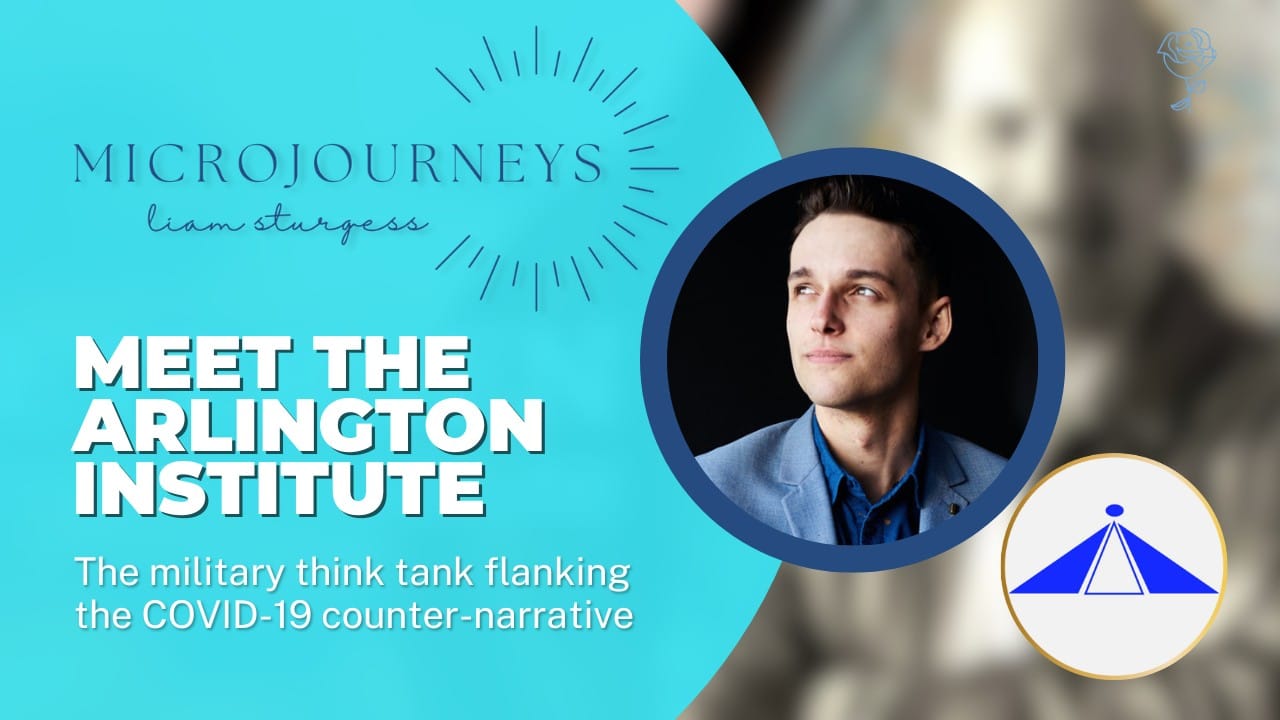
It’s my opinion that this whole COVID thing is really the key opportunity that is presented to us all as individuals to make decisions one way or another on this issue. And in so doing, kind of identify those who are going to see the world differently and see themselves differently, and those who are going to go along with the conventional perspective.
These are the words of John L. Petersen, founder of a little-known West Virginia think tank called The Arlington Institute.[1] He was speaking with filmmaker James Patrick, whose film Planet Lockdown would premiere one month later at the Coolfont Resort in Berkeley Springs, West Virginia, in November 2021. There would be wine, cheese, and much discussion to be had between Patrick, the stars of the film, and “other like-minded folks who are really quite interested in this big issue.”
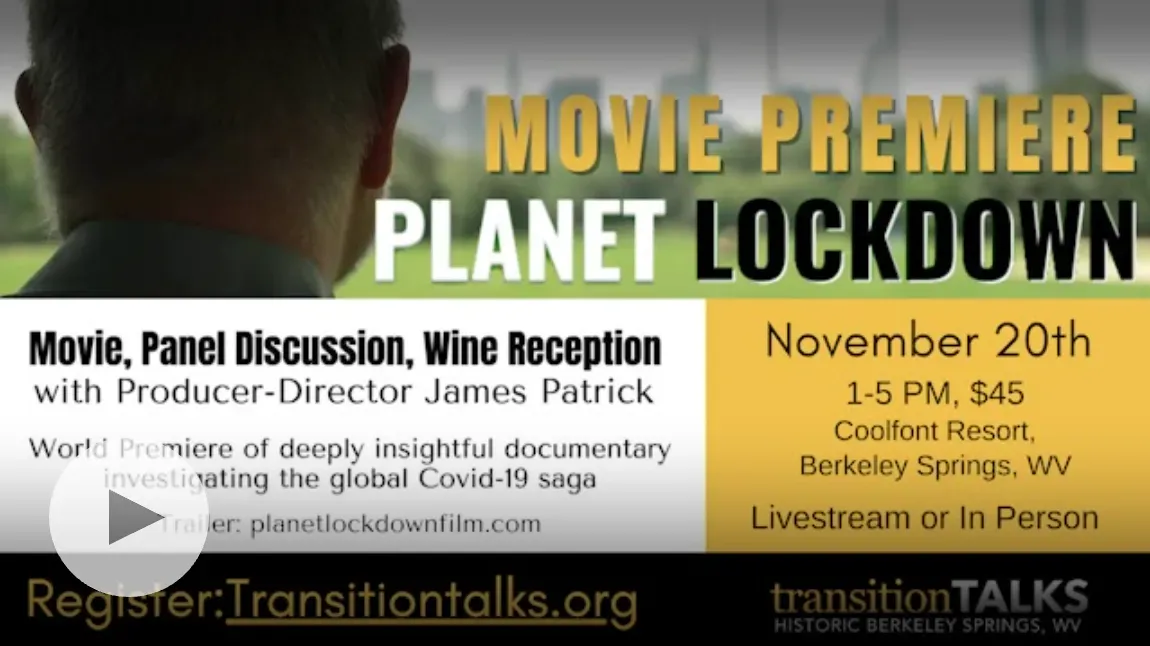
Among those interviewed for Planet Lockdown were Catherine Austin Fitts, founder of The Solari Report;[2] Reiner Fuellmich, a German lawyer leading the Corona Investigative Committee (CIC);[3] Wolfgang Wodarg, former member of German parliament and CIC co-host;[4] Michael Yeadon, a former Pfizer executive;[5] and David E. Martin, a patent specialist.[6] Each of these individuals, and many of the others who appeared in the interview series, played a significant role in shaping aspects of the “counter-narrative” around COVID-19.[7]
While one might assume that the Arlington Institute chose to host the premiere of this decisively dissident film because it is itself a dissident organization, the reality is far more complicated. Unlike groups such as Children’s Health Defense, the Brownstone Institute, or the Informed Consent Action Network (for example), the Arlington Institute doesn’t engage in advocacy or legal efforts around bodily autonomy, self-determination, or informed consent. Rather than opposing COVID-19-era policies as intense government overreach, Petersen described “this whole COVID thing” as “the key opportunity”—language much more in line with opportunists like Klaus Schwab and the World Economic Forum than someone trying to fend off disaster.
The public face of the Arlington Institute is suggestive of a place where open minds can gather. For decades, the Arlington Institute has held space for the “wackiest” ideas to thrive and be exchanged. UFOs, remote viewing, psychedelics, alternative medicine, reincarnation, telepathy, forbidden history, and all manner of spiritualism—month after month, these are the topics of discussion at the Arlington Institute’s Transition Talks, of which Planet Lockdown was one. In a given month, members of the institute are treated to a presentation on future warfare from top military brass; the following month, a masterclass on alternative medicine and regenerative agriculture.
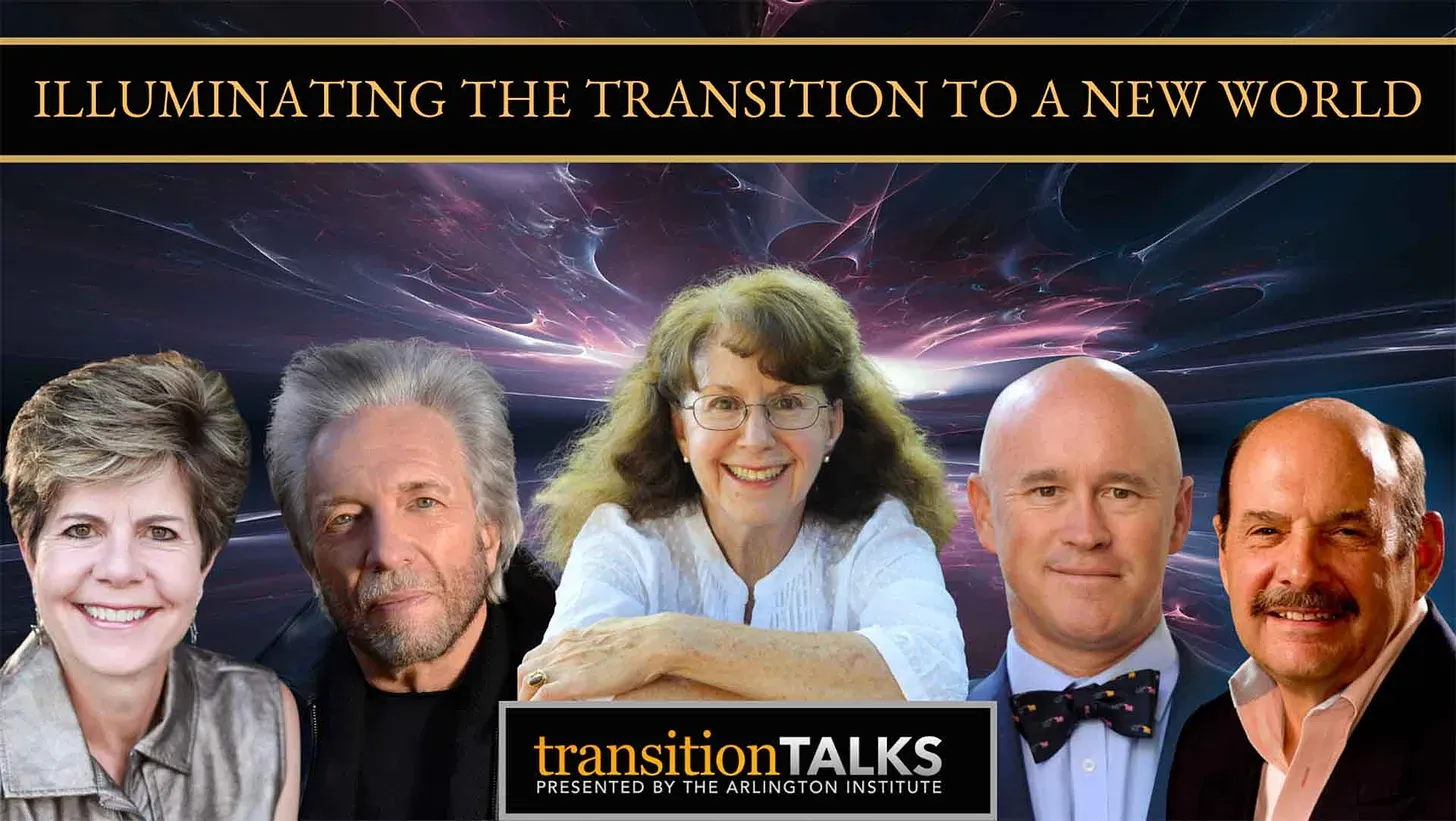
A review of TAI’s list of past speakers reveals an odd mixture of people with long and respected backgrounds in alternative health and spirituality communities, as well as a number who come from the more esoteric corners of the military and intelligence world.
Examples from the first group include author Charles Eisenstein, campaign advisor for independent presidential candidate Robert F. Kennedy Jr., and Sally Fallon Morell, founder of the Weston A. Price Foundation, a major advocate for clean food, regenerative agriculture and the healing arts.
From the second group, examples include Dennis Bushnell, long-time chief scientist and “future warfare” specialist at NASA Langley Research Center;[8] Robert David Steele, a former Central Intelligence Agency officer who “reportedly died” of COVID-19 in August 2021;[9] and Joseph McMoneagle, Paul H. Smith and Harold Puthoff, leading participants in MKUltra-adjacent[10] remote viewing experiments through the Stargate Project.[11]
Per its website, TAI offers several membership tiers, each with escalating perks.[12] For $25/month, members gain access to “premium content” in the form of pre-recorded round table discussions, monthly Q&As with founder John Petersen, and opportunities to join the studio audience during taped recordings. The $250/year premium tier offers all of the above, plus discounts on live events such as the Planet Lockdown premiere.

But the real perk is the larger community one can join. According to TAI Research Fellow Joel Snell,[13] the institute’s membership over the years has included David Gergen, counselor to President Bill Clinton; Arkady Shevchenko, Soviet defector and Under-Secretary-General of the United Nations;[14] Elmo Zumwalt, former Chief of Naval Operations;[15] and even former CIA Director William Colby.
Some may glance over this and applaud TAI’s diversity of community, fostering a space where no idea is too “out there.” TAI seems to have served as a melting pot of ideas, bringing together thinkers and doers from across the spectrum (every spectrum). But a critical review of its history, leadership, and trajectory suggests there may be more going on than meets the eye.
A New National Security

John L. Petersen, the institute’s founder, is a Navy veteran and self described “futurist.”[16] He was a flight officer in the United States Navy and the Navy Reserve, and describes himself as “a decorated veteran of both the Vietnam and Persian Gulf wars.” His “government and political experience include stints at the National War College, the Institute for National Security Studies, the Office of the Secretary of Defense, and the National Security Council staff at the White House.”[17]
Notably, Petersen claims to have twice been the “runner-up candidate to be Secretary of the Navy.” He also “served in senior positions for a number of presidential political campaigns.”[18]
Petersen was an elected delegate to the Democratic National Convention in 1984 during the presidential race between Ronald Reagan and Walter Mondale.[19] According to Petersen, he grew concerned that national security issues would not play a major role in any campaign in the next presidential race in 1988.
So, in 1986, he approached several colleagues in the national security space to create and co-lead an “ad-hoc group of national security experts” called the National Security Group.[20] The mandate of the privately funded, bipartisan group over its 18-month lifespan was “to explore and map the security environment that the successful candidate would have to operate within after the 1988 presidential campaign.”
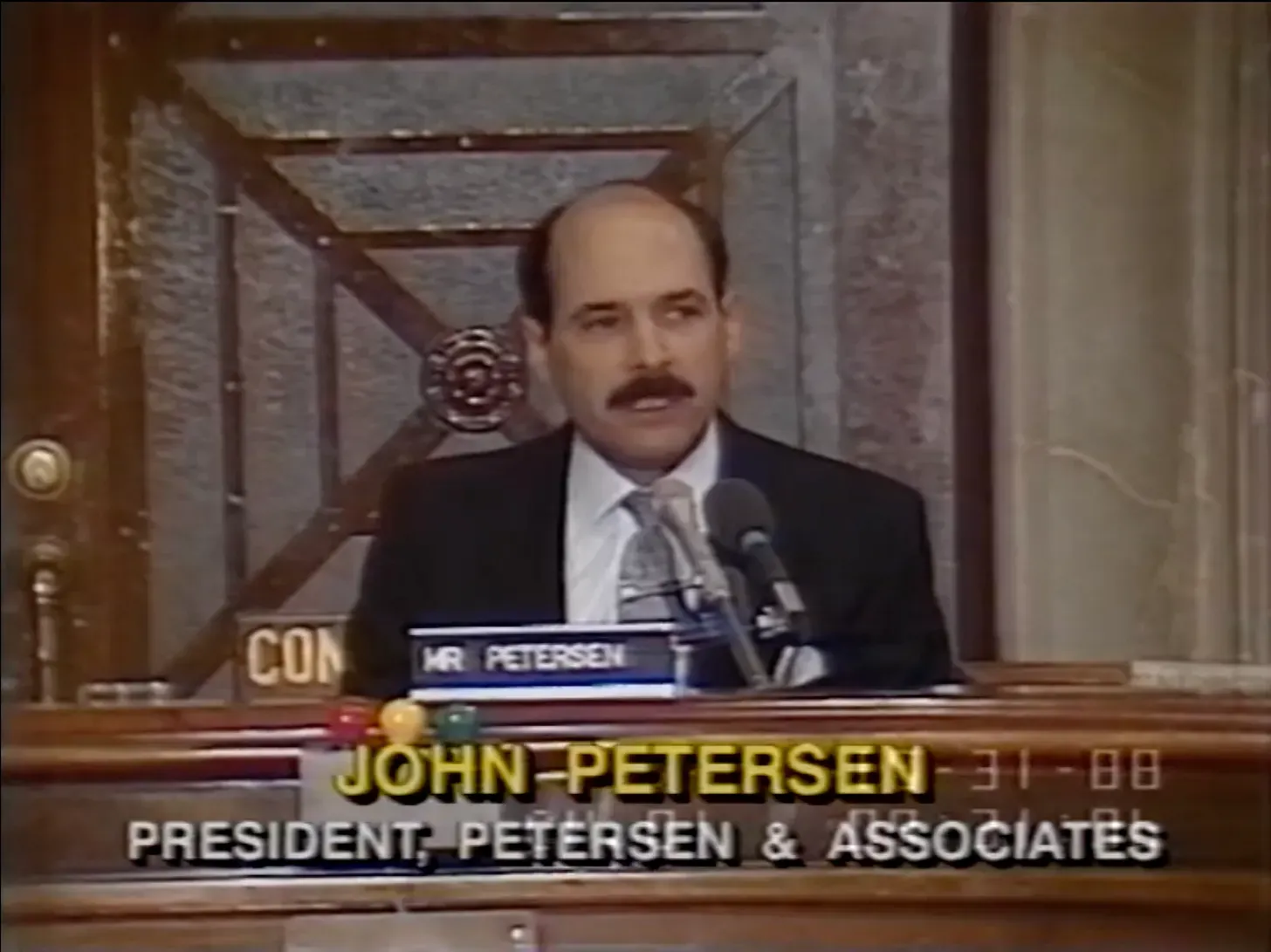
Petersen authored the final report for the group, titled The Diffusion of Power: An Era of Realignment, published in 1988, “which became a strategy document used at the highest levels of the Department of Defense.”[21] The report was sponsored by the National Strategy Forum, who also sponsored an event in the Senate Foreign Relations Committee hearing room on October 31, 1988, where Petersen and others presented their findings.[22][23] In short, the report stated that the United States had entered “a new era” of national security. President George H.W. Bush was the beneficiary of the National Security Group’s research, having beaten Michael Dukakis in November 1988.
At the end of this first phase of his career, Petersen had built the resumé of a classic Washington insider on the national security/defense side of the street.
Founding the Arlington Institute
Following his work with the National Security Group, Petersen launched The Arlington Institute for National Strategy “to help redefine the concept of national security in much larger, comprehensive terms by introducing the rapidly evolving global trends of population growth, environmental degradation, scientific/technological explosion, and social value shifts into the traditional national defense equation that had focused on ‘killing people and breaking things.’”[24] TAI “specialize[d] in helping U.S. Military leaders develop forward-thinking images of a positive future.” Petersen envisioned “a ‘New Military’ that is proactive, preventative, and active in a number of unconventional areas.”[25]
On May 6, 1992, the think tank shortened its name to The Arlington Institute.[26] Over the years to come, the institute appears to have offered its services to a range of clients from the military-industrial complex, including Boeing, Lockheed Martin, and the Office of the Secretary of Defense, as well as the United States Coast Guard, Marines Corps, and Navy.[27][28][29]
Military Leadership
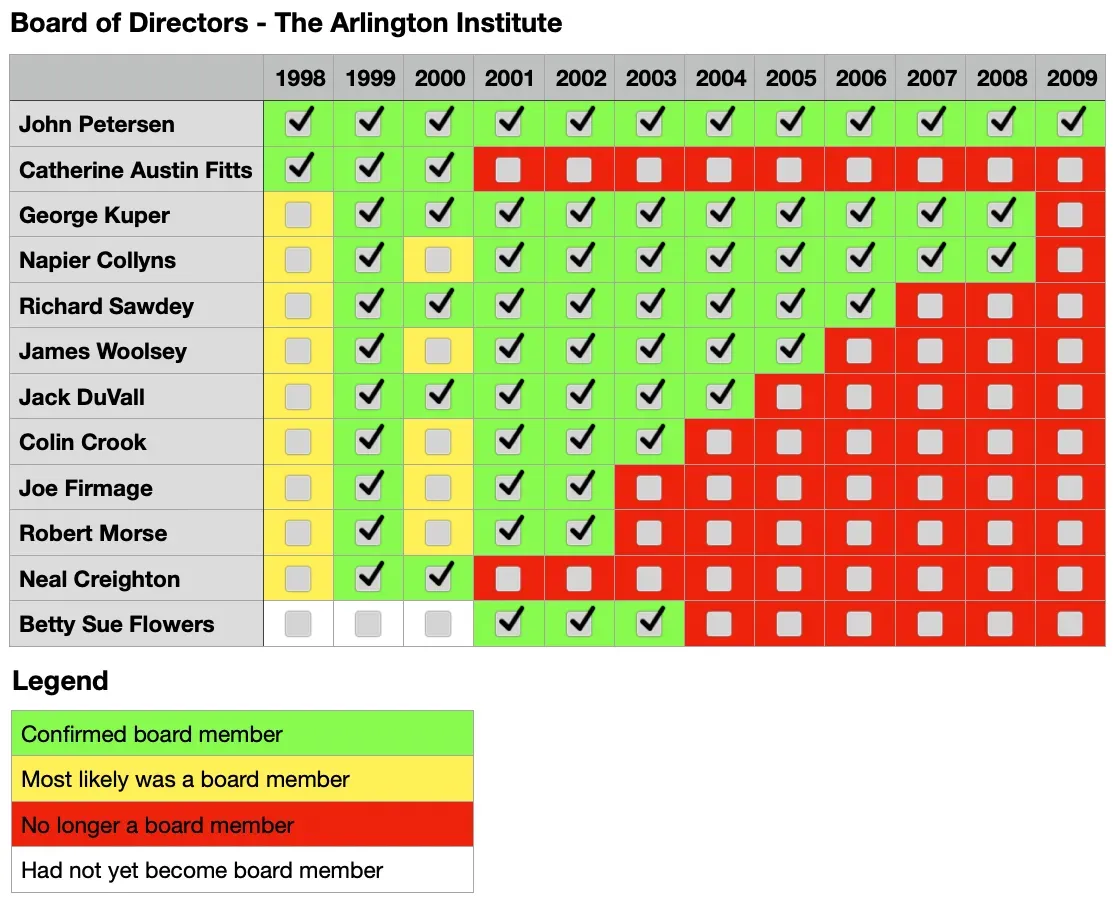
In its early days, the Arlington Institute boasted a board of directors chock-full of military and intelligence leadership figures, and a robust support staff to back them up. Through its peak in the 1990s, TAI’s board included then-current and former officials from the CIA, the United States Army and Navy, the Department of Defense, the National Security Council, the Executive Office of the President of the United States, and multiple Presidential Commissions.
James Woolsey
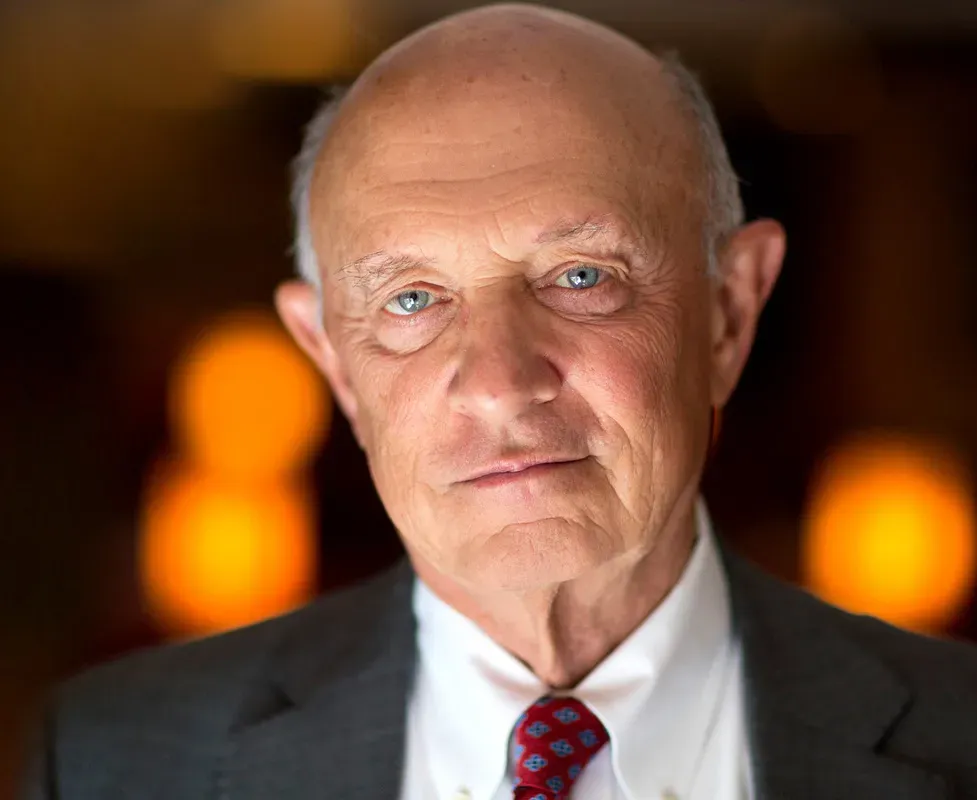
Most notable among these is R. James Woolsey, who served as director of the CIA from 1993-1995 under President Bill Clinton. He officially joined the Arlington Institute as a director in 1992 while also serving as Chairman of a Special Task Force for the Director of Central Intelligence, less than one year prior to taking control of the most powerful intelligence agency in the world.[30] Corporate filings confirm he remained as director until 2005.[31]
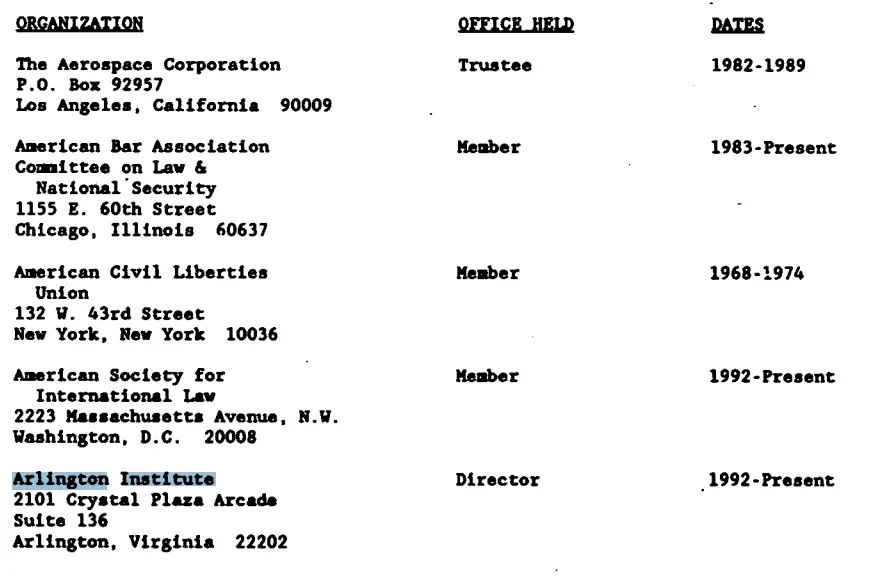
Woolsey’s participation on TAI’s board is significant, given his CIA directorship and other activities around this time. He was a member of the Project for a New American Century (PNAC),[32] and was a signatory to its January 26, 1998 letter to President Clinton that called for regime change in Iraq.[33] He had also served in high-level positions in the Navy; he was Under Secretary of the Navy from 1977-1979, then joined the Chief of Naval Operations Executive Panel in 1980 as a permanent member.[34]
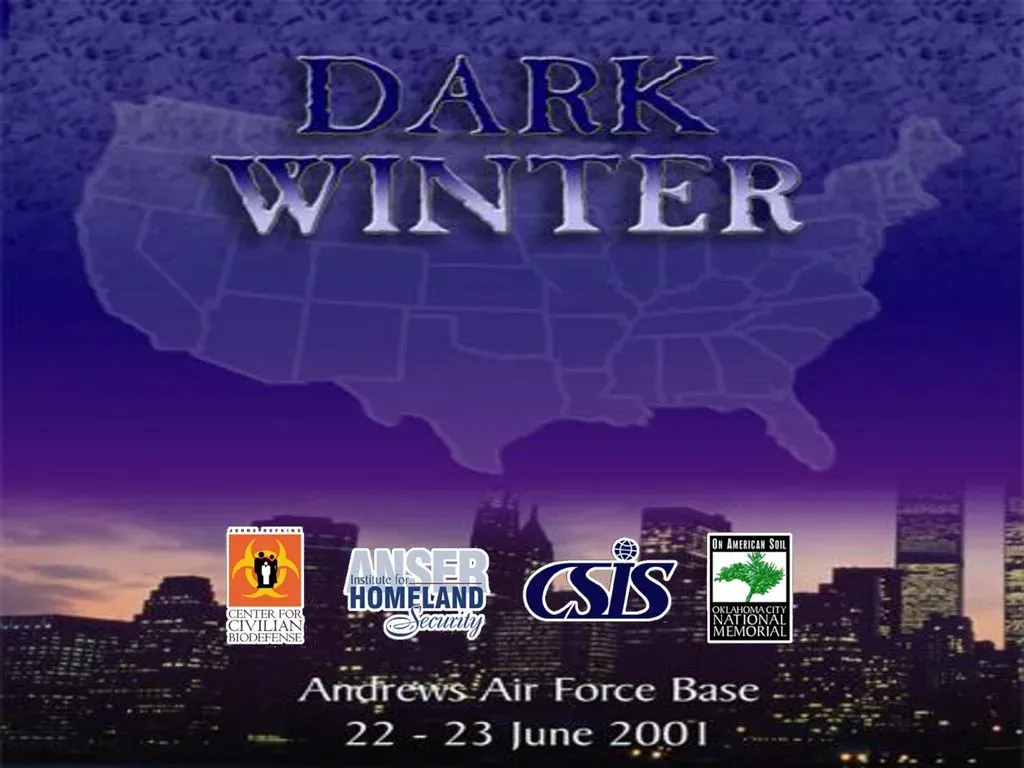
In June 2001, Woolsey participated in Operation Dark Winter,[35] an infamous pandemic preparedness exercise that was “eerily prescient” in its similarities to the subsequent October 2001 anthrax attacks[36] — which, coincidentally, were initially blamed on Iraq, helping the United States Government construct a narrative that Saddam Hussein was covertly stockpiling weapons of mass destruction.[37][38] David Gergen, previously identified as a TAI member, also participated in the exercise.
Jack DuVall
Board member Jack DuVall also has a history of influencing U.S. foreign policy with Iraq. DuVall, an Air Force veteran who served in the Executive Office of the President of the United States and worked as a speechwriter for multiple presidential candidates, served as the founding director of the International Center on Nonviolent Conflict (ICNC).[39]
In fall 2003, DuVall published an article in Sojourners Magazine alongside his co-founder, Peter Ackerman, in which the pair advocated for “civilian-based, nonviolent resistance by the Iraqi people, developed and applied in accordance with a strategy to undermine Saddam [Hussein]’s basis of power.”[40] This, argued Stephen Gowans in an August 6, 2009 blog post, reveals DuVall’s role among “a faction within the U.S. ruling class that pushes for a nonmilitary means of achieving… regime change in countries that resist integration into the U.S. imperial orbit.”[41] Gowan’s article describes this as one example of “Peter Ackerman’s quest to do what the CIA used to do, and make it seem progressive.”
And while ICNC claims to be entirely independent of government, it has reportedly received substantial funding from CIA “pass through” organizations.[42] Ackerman also served on the board of the Albert Einstein Institution (AEI), with which ICNC has worked closely, and which has benefited from the generous sponsorship of these same intelligence-linked entities such as the Ford Foundation, the International Republican Institute, and the National Endowment for Democracy, as well as the Department of Defense itself.[43]
In June 2022, Ackerman was accused by Georgian Prime Minister Irakli Garibashvili of being “the sponsor and ideologist” of an attempted colour revolution in the Eastern European nation.[44]
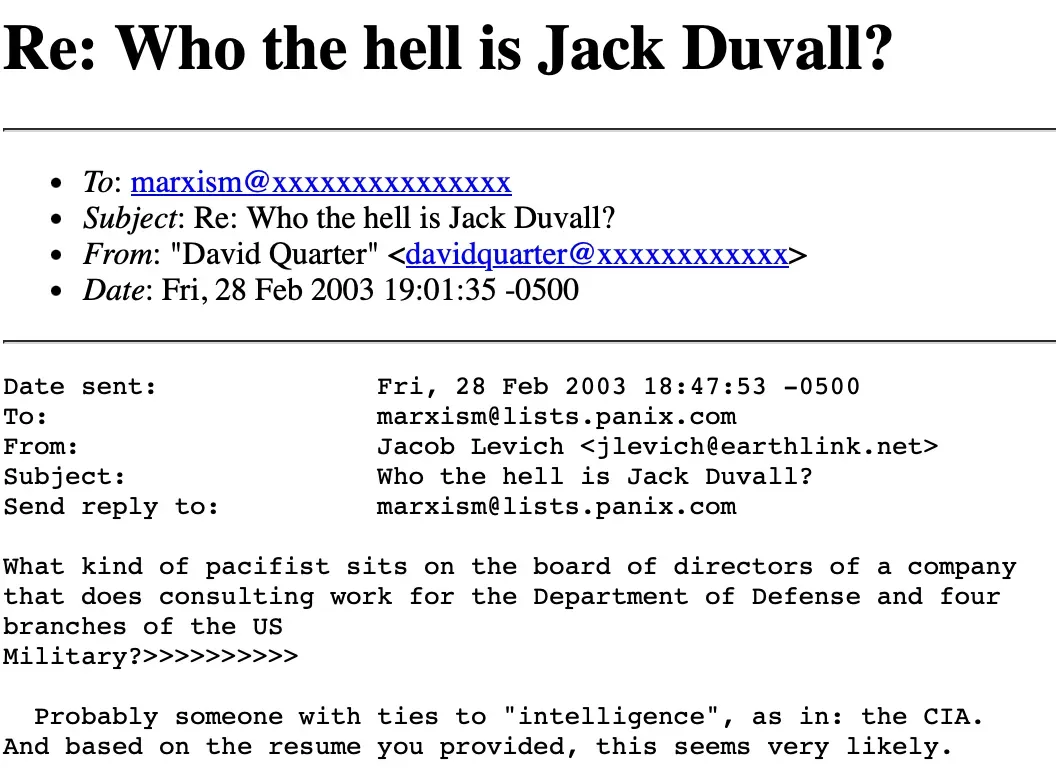
DuVall has been accused of being “a fraud and possibly some kind of spook… whose aim is to divide the antiwar movement.”[45] As pointed out by liberal antiwar activists Jacob Levich, Michael Barker, and David Quarter, DuVall’s role as a director of the military-intelligence-led Arlington Institute is impossible to square with his ostensible aversion to violent conflict, and that his “weird career details” suggested an ulterior agenda.[46][47] “What kind of pacifist sits on the board of directors of a company that does consulting work for the Department of Defense and four branches of the US Military?” asks Quarter.[48]
These military connections are ubiquitous across the early leadership team at the Arlington Institute. George Kuper previously worked within the Office of the Secretary of Defense as chairman of its Working Group on Dual Use Technology policy.[49] Colin Crook served as an advisor to the Department of Defense.[50] Robert Morse was a lieutenant in the United States Navy from 1967-1970.[51] Betty Sue Flowers served as a visiting advisor to the Secretary of the Navy.[52] Major General Neal Creighton led a squadron of the Army’s 11th Armored Cavalry Regiment during the 1968 Tet Offensive of the war in Vietnam, and subsequently held positions in the Offices of the Secretary of the Army and the Assistant Secretary of Defense.[53][54]
Wild Cards
As described on the Arlington Institute’s website, the early 1990’s saw Petersen working for the Department of Defense on various projects “to build a systematic understanding of the major approaches that were then being used to study and anticipate futures.”[55] One such project saw him embark on a worldwide trip on behalf of the Office of the Secretary of Defense, “visiting the foremost practitioners of futures research to assess each methodology and attempt to develop a new, synthetic approach that drew from the best of the then current processes.”
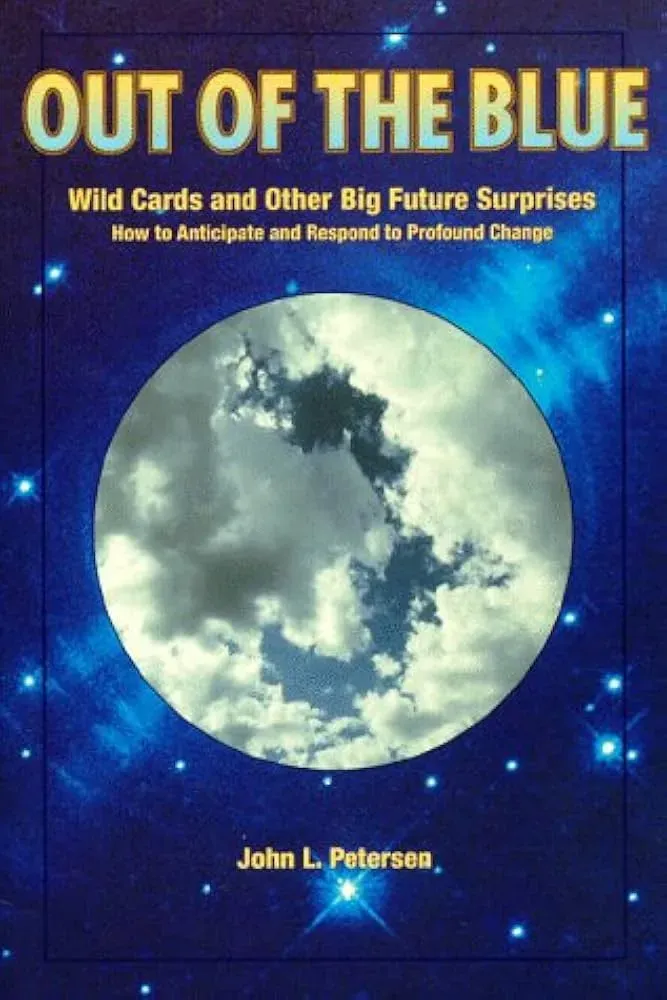
This would eventually lead to the publication of several books, including Out of the Blue: Wild Cards and Other Big Future Surprises.[56] Published in 1997, the book focuses on “Wild Cards,” described as “major surprises… high-impact events which come out of the blue.”[57] (Emphasis is from the book.) Wild Cards are contrasted with trends, defined as “a general current of change—typically gradual and long-term change—that becomes a directing force for the future.”
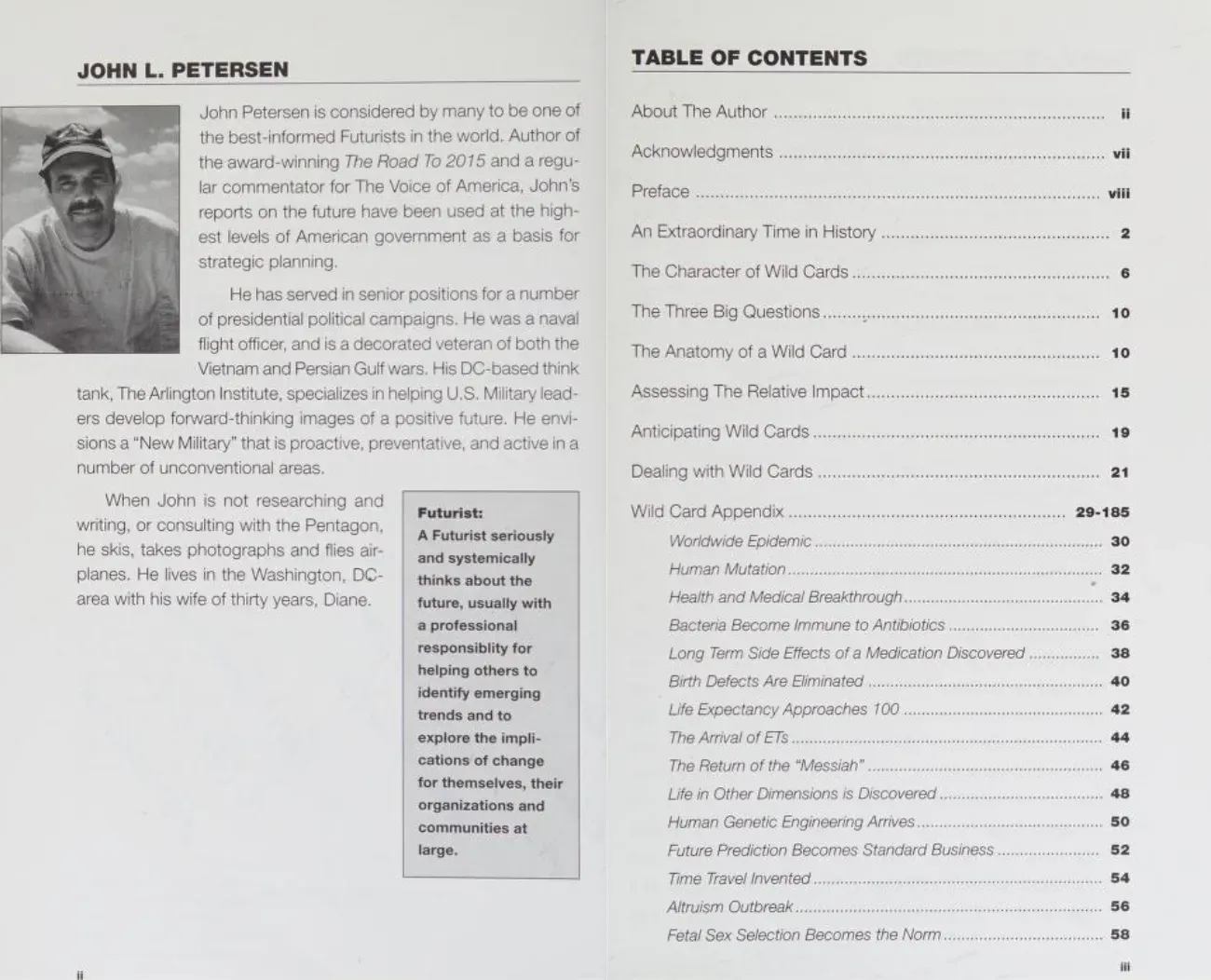
Petersen warned that “Wild Cards can radically change our outlook, and indeed our lives. Some do so, almost overnight.” Some of the Wild Cards Petersen suggests as possible include a worldwide epidemic; the discovery of long-term side effects from a medication; the arrival of human genetic engineering; the failure of the U.S. economy; a second American Civil War; a worldwide no-carbon economy; the development of self-aware machine intelligence; biological terrorism; rapid climate change; and a global financial revolution using “E-Cash.”[58]
As far as predictions go, that ain’t bad for 1997.
Thanks for reading! This is Part I in my investigative series on The Arlington Institute. Subscribe for free or become a paid supporter to be the first to receive Part II, which will dive deeper into the history of scenario planning, and some eerily specific predictions which may be shaping our world today.
PLANET LOCKDOWN Premiere, coming to TransitionTALKS November 20, 2021. (2021, October 20). Arlington Institute. https://arlingtoninstitute.org/planet-lockdown-premiere-coming-to-transitiontalks-november-20-2021/ ↩︎
Shepherd, K. (2021, February 10). Facebook and YouTube ban “Planet Lockdown” film filled with coronavirus falsehoods, after it was shared by millions. Washington Post. http://archive.today/2021.02.10-201606/https://www.washingtonpost.com/nation/2021/02/10/planet-lockdown-coronavirus-facebook-youtube/ ↩︎
Corona Investigative Committee. (2022, February 23). Totality of Evidence. http://archive.today/2024.02.24-224548/https://totalityofevidence.com/corona-investigative-committee/ ↩︎
Taylor, L. (2010, January 4). EU to probe pharma over “false pandemic.” PharmaTimes. https://web.archive.org/web/20231208151115/https://www.pharmatimes.com/news/eu_to_probe_pharma_over_false_pandemic_982876 ↩︎
Stecklow, S., & Macaskill, A. (2021, March 18). The ex-Pfizer scientist who became an anti-vax hero. Reuters. https://web.archive.org/web/20220116183622/https://www.reuters.com/investigates/special-report/health-coronavirus-vaccines-skeptic/ ↩︎
Speakers: David E. Martin, PhD. World Intellectual Property Organization. Retrieved February 24, 2024, from http://archive.today/2024.01.18-211143/https://www.wipo.int/meetings/en/2006/scp_of_ge_06/speakers/martin.html ↩︎
planetlockdown (page 6). Rumble. Retrieved January 25, 2024, from https://web.archive.org/web/20240125001907/https://rumble.com/user/planetlockdown?page=6 ↩︎
Bushnell, D. M. (2001, July). Future Strategic Issues/Future Warfare [Circa 2025]. NASA Langley Research Center. https://alachuacounty.us/Depts/epd/EPAC/Future Strategic Issues - Future Warfare Circa 2025 - NASA.pdf ↩︎
Mistler, S. (2021, August 30). Conspiracy Theorist Who Spoke At Far-Right Rally In Maine Dies Of COVID-19. Maine Public Broadcasting Network. http://archive.today/2022.01.12-015104/https://www.mainepublic.org/politics/2021-08-30/conspiracy-theorist-who-spoke-at-far-right-rally-in-maine-dies-of-covid-19 ↩︎
Andrews, R. (2018, September 20). What Was The Secret Cold War CIA Program “MKUltra” Really About? IFLScience. https://www.iflscience.com/what-was-secret-cold-war-program-mkultra-really-about-48315 ↩︎
Joseph McMoneagle and the Stargate Project. The Monroe Institute. Retrieved October 30, 2024, from https://www.monroeinstitute.org/blogs/blog/joseph-mcmoneagle-and-the-stargate-project ↩︎
Go Premium to Access More Specialized Content. Arlington Institute. Retrieved October 30, 2024, from https://arlingtoninstitute.org/premium/ ↩︎
Positions and Courses Taught. Social Vibes. Retrieved December 18, 2023, from http://archive.today/2023.12.18-202503/https://www.socialvibes.net/socialvi/positions-and-courses-taught/ ↩︎
Shevchenko, A. N. (1986). Breaking with Moscow. Knopf. https://archive.org/details/breakingwithmosc00shev_0/page/n7/mode/2up ↩︎
Zumwalt, Elmo R., Jr. Naval History and Heritage Command. Retrieved October 23, 2016, from https://web.archive.org/web/20161023101801/https://www.history.navy.mil/our-collections/photography/us-people/z/zumwalt--elmo-r---jr-.html ↩︎
Our History. The Arlington Institute. Retrieved December 6, 2023, from https://web.archive.org/web/20231206234839/https://arlingtoninstitute.org/about-us/our-history/ ↩︎
John Petersen Speaker. Simply Life India Speakers Bureau. Retrieved June 2, 2023, from https://web.archive.org/web/20230602143007/https://www.simplylifeindia.com/john-petersen.html ↩︎
Petersen, J. L. (1997). Out of the blue: wild cards and other big future surprises, how to anticipate and respond to profound change (p. ii). Danielle Laporte Book; The Arlington Institute. https://archive.org/details/outofbluewildcar0000pete/page/n5/mode/2up ↩︎
John L. Petersen. Kosmos Journal. Retrieved December 30, 2023, from https://web.archive.org/web/20231230104006/https://www.kosmosjournal.org/contributor/john-l-petersen/ ↩︎
Diffusion of Power in an Era of Realignment. (1988, October 31). C-SPAN. https://web.archive.org/web/20170706061707/https://www.c-span.org/video/?4882-1/diffusion-power-era-realignment ↩︎
Our History. The Arlington Institute. Retrieved December 6, 2023, from https://web.archive.org/web/20231206234839/https://arlingtoninstitute.org/about-us/our-history/ ↩︎
Diffusion of Power in an Era of Realignment. (1988, October 31). C-SPAN. https://web.archive.org/web/20170706061707/https://www.c-span.org/video/?4882-1/diffusion-power-era-realignment ↩︎
National Security Group. (1988). The Diffusion of Power: An Era of Realignment. National Strategy Forum. https://search.worldcat.org/title/20685264?oclcNum=20685264 ↩︎
Our History. The Arlington Institute. Retrieved December 6, 2023, from https://web.archive.org/web/20231206234839/https://arlingtoninstitute.org/about-us/our-history/ ↩︎
Petersen, J. L. (1997). Out of the blue: wild cards and other big future surprises, how to anticipate and respond to profound change (p. ii). Danielle Laporte Book; The Arlington Institute. https://archive.org/details/outofbluewildcar0000pete/page/n5/mode/2up ↩︎
Commonwealth of Virginia State Corporation Commission. The Arlington Institute. OpenCorporates. Retrieved December 18, 2023, from https://opencorporates.com/companies/us_va/03501392 ↩︎
Hardy, M. (2002, February 4). Institute aims to discern the future from media analysis. Boston Business Journal. http://archive.today/2023.12.13-231722/https://www.bizjournals.com/boston/blog/mass-high-tech/2002/02/institute-aims-to-discern-the-future-from.html ↩︎
Clients. The Arlington Institute. Retrieved November 13, 2001, from https://web.archive.org/web/20011113015826/http://www.arlingtoninstitute.org/about_tai/clients.html ↩︎
Alliances & Clients. The Arlington Institute. Retrieved January 26, 2001, from http://archive.today/2001.01.26-105900/http://www.arlingtoninstitute.org/about_tai/alliances.html ↩︎
U.S. Government Printing Office. (1993, February). Nomination of R. James Woolsey to be Director of Central Intelligence. Senate Committee on Intelligence. https://web.archive.org/web/20240117002533/https://www.intelligence.senate.gov/sites/default/files/hearings/103296.pdf ↩︎
The Arlington Institute - Form 990 for period ending Dec 2005 - Nonprofit Explorer. (2006, July 17). ProPublica. https://projects.propublica.org/nonprofits/display_990/541524343/2006_08_EO/54-1524343_990_200512 ↩︎
Wedel, J. R. (2009). Shadow Elite: how the world’s new power brokers undermine democracy, government, and the free market (p. 170). Basic Books. https://archive.org/details/shadowelitehowwo0000wede/page/170/mode/2up?q=Woolsey ↩︎
1998 Letter on Iraq. (2001, December 3). New York Times, Section A, Page 9. https://archive.ph/2022.12.03-134446/https://www.nytimes.com/2001/12/03/world/1998-letter-on-iraq.html ↩︎
U.S. Government Printing Office. (1993, February). Nomination of R. James Woolsey to be Director of Central Intelligence. Senate Committee on Intelligence. https://web.archive.org/web/20240117002533/https://www.intelligence.senate.gov/sites/default/files/hearings/103296.pdf ↩︎
Dark Winter. Johns Hopkins Center for Health Security. Retrieved May 28, 2022, from http://archive.today/2022.05.28-075750/https://www.centerforhealthsecurity.org/our-work/exercises/2001_dark-winter/index.html ↩︎
U.S. Government Publishing Office. (2001, October 25). The Dark Winter Scenario and Bioterorrism. Subcommittee on Emerging Threats and Capabilities, Committee on Armed Services, United States Senate. http://archive.today/2020.05.17-193549/https://www.govinfo.gov/content/pkg/CHRG-107shrg79479/html/CHRG-107shrg79479.htm ↩︎
Rose, D., & Vulliamy, E. (2001, October 14). Iraq “behind US anthrax outbreaks.” The Guardian. http://archive.today/2014.12.17-055041/http://www.theguardian.com/world/2001/oct/14/terrorism.afghanistan6 ↩︎
MacQueen, G. (2014). The 2001 Anthrax Deception: The Case for a Domestic Conspiracy. Clarity Press. https://archive.org/details/graeme-mac-queen-the-2001-anthrax-deception-the-case-for-a-domestic-conspiracy-clarity-press-2014 ↩︎
Who We Are. International Center on Nonviolent Conflict. Retrieved August 6, 2005, from https://web.archive.org/web/20050806232617/http://www.nonviolent-conflict.org/whoWeAre.shtml ↩︎
Ackerman, P., & DuVall, J. (2002, September). With Weapons of the Will. Sojourners. http://archive.today/2024.02.24-012911/https://sojo.net/magazine/september-october-2002/weapons-will ↩︎
Gowans, S. (2009, August 6). Overthrow Inc.: Peter Ackerman’s quest to do what the CIA used to do, and make it seem progressive. What’s Left. http://archive.today/2023.01.18-160705/https://gowans.blog/2009/08/06/overthrow-inc-peter-ackerman’s-quest-to-do-what-the-cia-used-to-so-and-make-it-seem-progressive/ ↩︎
Bramhall, S. J. (2012, March 13). Why the CIA Funds Nonviolence Training. Dissident Voice | a Radical Newsletter in the Struggle for Peace and Social Justice. http://archive.today/2019.02.21-153824/https://dissidentvoice.org/2012/03/why-the-cia-funds-nonviolence-training/ ↩︎
A Force More Powerful to Air September 18 and 25: New Documentary on Nonviolent Struggle. (2000). Nonviolent Struggle, 7(1), 1. Albert Einstein Institution. https://web.archive.org/web/20131019003901/http://www.aeinstein.org/organizations/org/22_fall2000-1.pdf ↩︎
Nikoladze, T. (2022, June 14). Georgian PM Garibashvili: “We do not want war, even if it is the price of joining the EU.” JAMnews. http://archive.today/2023.01.30-120000/https://jam-news.net/georgian-pm-garibashvili-we-do-not-want-war-even-if-it-is-the-price-of-joining-the-eu/ ↩︎
Levich, J. (2003, February 28). Who the hell is Jack Duvall? The Marxism Archives; University of Utah Department of Economics. http://archive.today/2003.09.01-233735/http://archives.econ.utah.edu/archives/marxism/2003w08/msg00187.htm ↩︎
Ibid. ↩︎
Barker, M. (2008, August 25). Promoting “democracy” through civil disobedience. Green Left Weekly. http://archive.today/2009.03.02-071352/http://www.greenleft.org.au/2007/722/37496 ↩︎
Quarter, D. (2003, February 28). Re: Who the hell is Jack Duvall? The Marxism Archives; University of Utah Department of Economics. http://archive.today/2003.11.03-103113/http://archives.econ.utah.edu/archives/marxism/2003w08/msg00188.htm ↩︎
Erb Advisory Board Search. Frederick A. and Barbara M. Erb Institute for Global Sustainable Enterprise. Retrieved June 4, 2010, from https://web.archive.org/web/20100604221107/http://erb.umich.edu/People-and-Partners/Advisory-Board/#kuper ↩︎
Board of Directors. The Arlington Institute. Retrieved September 23, 2001, from http://archive.today/2001.09.23-203418/http://www.arlingtoninstitute.org/about_tai/board_of_directors.html ↩︎
Robert Morse Obituary (2019) - New York, NY - New York Times. (2019, April 28). Legacy. http://archive.today/2023.12.18-210226/https://www.legacy.com/us/obituaries/nytimes/name/robert-morse-obituary?id=14629348 ↩︎
Betty Sue Flowers, PhD. American Councils. Retrieved December 18, 2023, from http://archive.today/2023.12.18-230844/https://www.americancouncils.org/betty-sue-flowers-phd ↩︎
Neal Creighton Obituary (1930 - 2020) - Winfield, IL - Chicago Tribune. (2020, September 27). Legacy. http://archive.today/2023.12.18-204145/https://www.legacy.com/us/obituaries/chicagotribune/name/neal-creighton-obituary?id=2838667 ↩︎
Perspectives of the Tet Offensive. (2008, May 2). Robert R. McCormick Foundation. https://web.archive.org/web/20181001213208/http://documents.mccormickfoundation.org/news/2008/FDMatCantigny/pr050208.aspx ↩︎
About The Arlington Institute. Arlington Institute. Retrieved December 6, 2023, from http://archive.today/2023.12.06-234602/https://arlingtoninstitute.org/about-us/ ↩︎
Petersen, J. L. (1997). Out of the blue: wild cards and other big future surprises, how to anticipate and respond to profound change. Danielle Laporte Book; The Arlington Institute. http://archive.today/2024.01.27-220642/https://search.worldcat.org/title/Out-of-the-blue-:-wild-cards-and-other-big-future-surprises-:-how-to-anticipate-and-respond-to-profound-change/oclc/37745851 ↩︎
Petersen, J. L. (1997). Out of the blue: wild cards and other big future surprises, how to anticipate and respond to profound change (p. 1). Danielle Laporte Book; The Arlington Institute. https://archive.org/details/outofbluewildcar0000pete/page/n11/mode/2up ↩︎
Petersen, J. L. (1997). Out of the blue: wild cards and other big future surprises, how to anticipate and respond to profound change (p. iii). Danielle Laporte Book; The Arlington Institute. https://archive.org/details/outofbluewildcar0000pete/page/n5/mode/2up ↩︎